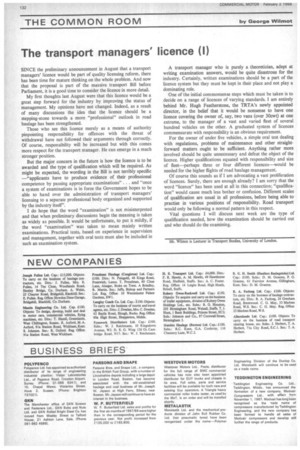The transport managers' licence (I)
Page 134

If you've noticed an error in this article please click here to report it so we can fix it.
SINCE the preliminary announcement in August that a transport managers' licence would be part of quality licensing reform, there has been time for mature thinking on the whole problem. And now that the proposal is part of the massive. transport Bill before Parliament, it is a good time to consider the licence in more detail.
My first thoughts last August were that this licence would be a great step forward for the industry by improving the status of management. My opinions have not changed. Indeed, as a result of many discussions the idea that the licence should be a stepping-stone towards a more "professional" outlook in road haulage has been strengthened.
Those who see this licence merely as a means of authority pinpointing responsibility for offences with the threat of withdrawal have not followed their arguments through correctly. Of course, responsibility will be increased but with this comes more respect for the transport manager. He can emerge in a much stronger position.
But the major concern in the future is how the licence is to be awarded and the type of qualification which will be required. As might be expected, the wording in the Bill is not terribly specific —"applicants have to produce evidence of their professional competence by passing appropriate examinations". . . and "once a system of examinations is in force the Government hopes to be able to hand over the administration of transport managers' licensing to a separate professional body organized and supported by the industry itself".
I do hope that the word "examination" is not misinterpreted and that when preliminary discussions begin the meaning is taken as widely as possible. It would be unfortunate, to put it mildly, if the word "examination" was taken to mean mainly written examinations. Practical tests, based on experience in supervision and management, together with oral tests must also be included in such an examination system. A transport manager who is purely a theoretician, adept at writing examination answers, would be quite disastrous for the industry. Certainly, written examinations should be a part of the licence system but they must be kept in their place and not play a dominating role.
One of the initial commonsense steps which must be taken is to decide on a range of licences of varying standards. I am entirely behind Mr. Hugh Featherstone, the TRTA's newly appointed director, in the belief that it would be nonsense to have one licence covering the owner of, say, two vans (over 30cwt) at one extreme, to the manager of a vast and varied fleet of several hundred vehicles on the other. A graduated system of licences commensurate with responsibility is an obvious requirement.
For the owner of under five vehicles, a simple oral test dealing with regulations, problems of maintenance and other straightforward matters ought to be sufficient. Anything rather more involved should be quite unnecessary and defeat the object of the licence. Higher qualifications equated with responsibility and size of fleet—perhaps three or four different licences—would be needed for the higher flights of road haulage management.
Of course this sounds as if I am advocating a vast proliferation of licences. Surely, there are enough already? I am sorry that the word "licence" has been used at all in this connection; "qualification" would cause much less bother or confusion. Different scales of qualification are usual in all professions, before being able to practise in various positions of responsibility. Road transport would only be following a normal pattern in this respect.
Vital questions I will discuss next week are the type of qualification needed, how the examination should be carried out and who should do the examining.
Mr. Wilmot is Lecturer in Transport Studies, University of London.




































































































































































































